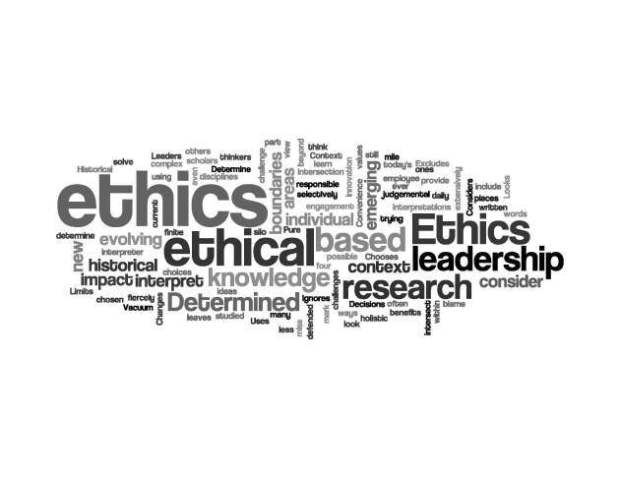Nowadays, the debate about the effectiveness of ethical leadership is become more often be discussed. Toor & Ofori (2009) said a good leadership is more than skill and understanding theory but also the ability to act ethically in their daily actions that can be followed by subordinates. Ethical leadership described as one of the main factors to become a good leader. Ethical leadership has the meaning as the ability to lead by apply the appropriate normative factors through develop a personal action that prioritise a two-way communication between leader and subordinates (Brown et al, 2000) in (Brown & Trevino, 2006). According to McCabe (2005) in the turbulent and uncertain economic condition, a leader must find ways to build a stronger relationship with subordinates and avoid arrogance in order to be successful. The usage of ethical standards will reduce the chances of workplace lawsuit and develop positive working environments. In addition, application of ethical leadership will avoid the tendency of the leader to misuse their power, such as anger, fraud, envy, greed, etc. to optimize the personal gain (Ciulla, 1995).
Butts (2008) suggest four necessary elements for leader to build a good ethical leadership structure. The first one is ethical communication, which adopt a truthful communication as a primary in a top-down approach. The second one is ethical succession planning. At this process, a leader must allow their subordinates to involve in every important process. The aim of this is to train the employees be ready to become a leader in the future that important for long-term success of the organization. The third one is ethical collaboration that means the collaboration between leader and employees to reduce risks at every level and solve organisation problems. With an ethical and good collaboration, leaders regularly decide a plausible solution for the good of the organisation. The last one is ethical tenure that means the ability of leader to develop character-driven leadership styles and subdue their ego for the successful of the organisation.
However, there are some challenges to apply ethical leadership at the organisations. According to Brown & Trevino (2006) there are some challenges of ethical leadership. The first one is ability to consistently to obey the establish ethic policies. For instance, negative react from employees will be happen if the leader violate and non-consistent in adhere the regulations. In addition complex policies to ensure the clarity must be confirmed by leader. Without a confirmation, ethical standards will become a gray area and will not run effectively. Moreover workplace culture and environment may become a challenge to ethical leadership. Because of over serious notice about ethical problems, employees may be afraid to speak out their ideas that will resist the creativity. At the last developing and maintaining ethical programs can be expensive and takes a lot of time. Proper ethic administrations regularly require an ethic officer to update and reflect the changes. Therefore, ethical leadership may decrease the organization efficiency and give some disadvantages.
Textile industry as my chosen industry can be an example to describe the effectiveness of ethical leadership. My internship experience in PT. Kayamatex, which is a textile factory in my country realise me about the importance of ethical leadership in the face of changing nature. The increase of global competition and economic downturn lead the company to get innovative ideas from all available resources apart from the leader. Therefore, company applies the regulation that every employees have an opportunity to express their ideas and involved in decision-making process. Communication between top-down employees established very well that affect company performances to the positive condition. All of the managers try to build a strong relationship with their subordinates through understanding the individual strong and weaknesses although culture of discipline still becomes the priority. This applied leadership style, success the company to build a well ethical standard and good working environments. This condition leads the low employee turnover and increase of productivity.
In conclusion, based on the explanation above can be concluded that ethical leadership is necessary to be developed by manager in modern organisations. Unethical leadership likes authoritarian style already not suitable with the changing time. Modern society with diverse challenges increase the need of team-work and collaboration that will run more effectively with a good respect from each other. Without ideal ethical leader that will acute self-awareness and avoid arrogance, cooperation within employees will not run effectively. Therefore, although need a lot of time and costly organisation without participation in prevention and training of ethic leadership programs put themselves at high possibility for several unethical and illegal acts in the future. However, to maximise the success of ethical leadership for better organization, leader must give an extra effort to preserve the consistency of ethical standards and to be a role model for their subordinates.
References:
Brown, M. B., Trevino, L. K. (2006) ‘Ethical Leadership: A Review and Future Directions’ The Leadership Quarterly [online] 17 (6), 595-616. Available from <http://www.sciencedirect.com/science/article/pii/S104898430600110X> [17 June 2013]
Butts, J. B. (2008) ‘Ethics in Organisations and Leadership’ Jones and Bartlett Publishers [online] 119-151. Available from <http://www.jblearning.com/samples/0763749761/EthicalLeaderhip.pdf> [17 June 2013]
Ciulla, J. B. (1995) ‘Leadership Ethics: Mapping The Territory’ Business Ethics Quarterly [online] 5 (1), 5-28. Available from <http://web.ebscohost.com/ehost/pdfviewer/pdfviewer?sid=acfc95a7-e0e3-48b3-a6ff-f743ffb804d8%40sessionmgr104&vid=8&hid=118> [17 June 2013]
McCabe, B. (2005) ‘The Disabling Shadow of Leadership’. Manager, British Journal of Administrative Management, 16-17
Toor, S. R., Ofori, G. (2009) ‘Ethical Leadership: Examining The Relationships With Full Range Leadership Model, Employee Outcomes, and Organisational Culture’ Journal of Business Ethics [online] 90, 533-547. Available from <http://web.ebscohost.com/ehost/pdfviewer/pdfviewer?sid=12df0be8-75ea-43dc-b158-96883831a37e%40sessionmgr111&vid=2&hid=114> [17June 2013]
